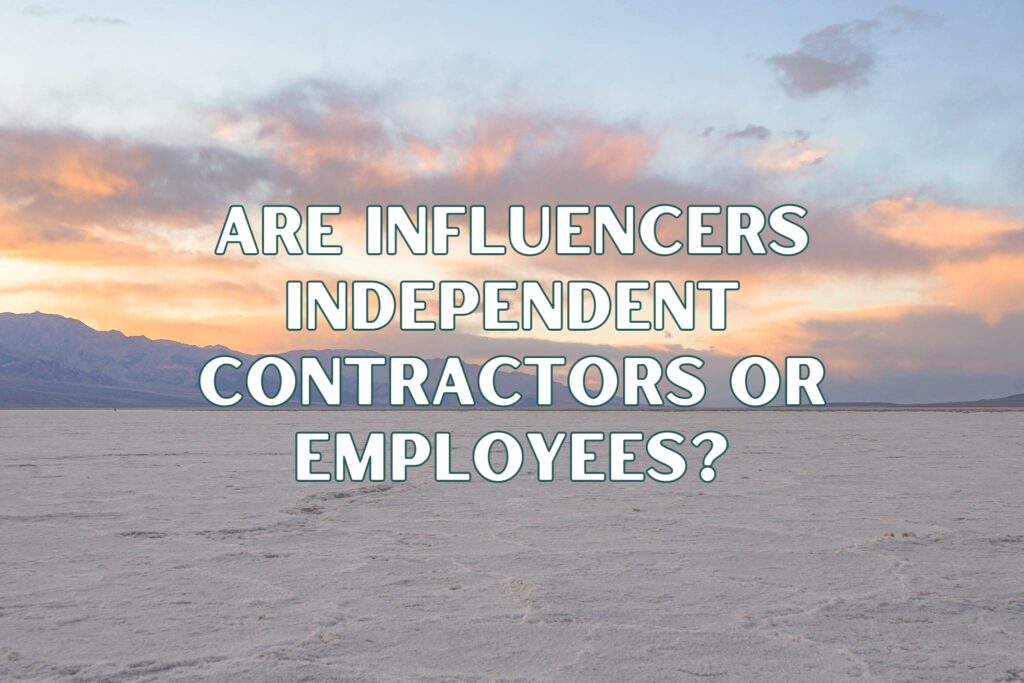The information contained in this “Are Influencers Independent Contractors or Employees?“ is for informational and educational purposes only. It is not to be construed as legal advice. Reading this article or relying on information from this article does not ever create an attorney-client relationship between you and Katherine Jaquith (aka Kate Cooper). Please speak with a licensed attorney for personalized business advice.

Are influencers independent contractors or employees? If you’re a brand that is planning on hiring influencers for a marketing campaign, or an influencer who wants to make sure you understand your legal obligations when working with brands, this is a question you may have asked yourself.
More often than not, an influencer is legally going to be considered an independent contractor. A brand deal is considered freelance work that the influencer is being hired to complete. The typical services an influencer provides includes content creation and marketing to the influencer’s social media audience. An influencer may also be hired on as an affiliate or ambassador.
Keep in mind, it’s not up to a company to decide whether an influencer is an independent contractor or an employee. The IRS has certain factors they consider when determining whether a worker is legally classified as an independent contractor. An influencer will most likely meet these factors, however there may be situations where a content creator works for a company as an employee.
Independent Contractors vs. Employees
There are a few key distinctions between an independent contractor and an employee. It’s important that businesses know these distinctions in order to classify workers properly. The primary thing that the IRS looks at when determining whether a worker is an independent contractor or an employee is the degree of behavioral control that the employer has over the worker. The IRS also considers financial control and the relationship between the parties.
On the other hand, an employer has greater control over employees. They can dictate when an employee works (subject to labor laws, of course), what an employee does at work, and how an employee completes their work.
An employer also has greater financial control over the employee. An employee is paid a salary or on an hourly basis. The employer is also responsible for withholding and paying taxes to the federal government on the employee’s behalf.
An independent contractor works for themselves. This means they can take on as many clients or, in the case of influencers, work with as many brands as they’d like. An independent contractor also has control over when and how they perform their work. Independent contractors are often hired for project or contract-based work.
Employees may also be legally entitled to certain benefits or paid leave depending on the state they are in. Benefits of being an employee can include, unemployment insurance, FMLA leave, worker’s compensation, minimum wage, and overtime protection.

Are Influencers Independent Contractors or Employees?
Signs an Influencer Is An Independent Contractor:
The IRS looks at several factors when determining whether someone should be considered an independent contractor or an employee. Here are some key indicators that an influencer is an independent contractor:
- The influencer controls how and when they do their job. While influencers may have contractually agreed upon deadlines to meet or a creative brief to follow, they generally control when and how they create content. This autonomy points to an influencer being an independent contractor.
- The influencer provides their own equipment. During an influencer campaign, the influencer is typically responsible for providing their own equipment. This can include a phone, camera, computer, and other equipment needed to create the content. This equipment is not provided by the brand.
- The influencer is being paid on a per-contract basis (i.e. a flat rate brand deal or a monthly retainer for a specified period of time).
Signs an Influencer or Content Creator is an Employee:
While in most situations an influencer is going to be considered an independent contractor, there may be unique situations where an influencer is hired as an employee of a company. It’s also not uncommon for companies to hire in-house content creators. Here are indicators that an influencer or content creator is an employee:
- The influencer or content creator is required to work at specific times or at specific locations.
- The employer controls how work is performed, along with the equipment to perform the work.
- The influencer or content creator is paid a salary or hourly wage.

What Does Being an Independent Contractor Mean For Influencers?
Influencers Are Responsible for Withholding & Paying Taxes
*The Legal Influence always encourages influencers and content creators to work directly with a CPA or other tax professional to ensure you are reporting, paying, and filing your taxes properly.*
When you work as an independent contractor for a brand as an influencer or content creator, you are responsible for withholding and paying state and federal income taxes. The brand will not withhold taxes on your behalf like they do for employees. If you earn more than $600 working with a brand as an independent contractor, you are required to provide the brand a W-9. The brand is then responsible for issuing you a 1099-misc at the end of the tax year.
As an independent contractor, creators and influencers are also responsible for paying self-employment taxes. This means you are responsible for paying 100% of your social security and Medicare taxes. Employees have 50% of those taxes covered by their employers.
Be aware, self-employed individuals are generally required to pay taxes quarterly, however there are some exceptions. Depending on the financial health and corporate status of your creator business, you may want to elect to be taxed as an S-corp to help save on self-employment tax. Again, please speak with a CPA or tax professional for individual tax advice!
Influencers Work on Their Own Time
One of the important differences between being an independent contractor and an employee, is that an independent contractor has control over when their work gets completed.
An influencer can agree to meet certain deadlines in their brand deal contract. However, they have the freedom to decide when they’re actually going to go out and shoot content. This time flexibility is one reason why many people pursue careers as influencers. It’s also one reason why brand deals are such an attractive income stream for influencers.
Influencers Own Their Intellectual Property
The distinction between being an independent contractor vs. an employee is very important for clarifying who owns the intellectual property that is created in connection with a brand partnership. A person who creates an original work (like a photo or video) owns the copyright for that work. An independent contractor remains the copyright owner for any content they create, unless the contract specifically states that it is a “work made for hire” and certain requirements are met.
When influencers work with brands they may grant the brand a license to use the content. The influencer and brand can negotiate the terms of the license. The license should cover how the brand can use the content, where they can use it, how long they can use it for, along with other important legal information.
When an employee creates content in the course of their normal job duties, the employer owns the content outright. This means having an in-house content creator who is employed by the company is going to be the most cost-effective way for a brand to acquire a large quantity of content along with full ownership of that content.
Influencers Can Take Business Deductions
While being a self-employed independent contractor comes with additional tax obligations, it also means you are in business for yourself. This means you can take reasonable business deductions when filing your taxes.
Being an influencer is still a relatively new career path and comes with very unique expenses and considerations. The Legal Influence always encourages influencers and content creators to consult with a CPA to make sure you’re maximizing your deductions legally.
Conclusion: Are Influencers Independent Contractors or Employees?
Properly classifying an influencer as an independent contractor as an employee is important for businesses. More often than not an influencer or content creator is legally considered an independent contractor. However, there may be situations where they should be classified as an employee.
If you’re an influencer or content creator it’s important to be aware of your legal status when working with brands, so you understand what your business and tax obligations are.
Follow @thelegalinfluence on Instagram & TikTok for more legal education content for creators!
Pin It For Later:


View comments
+ Leave a comment